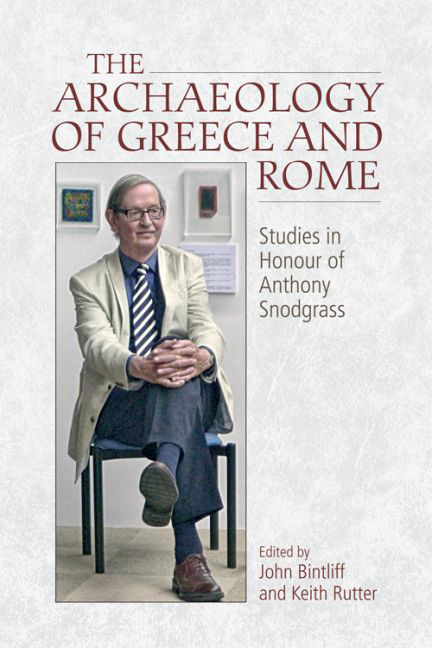Book contents
- Frontmatter
- Contents
- Preface
- List of Contributors
- List of Abbreviations
- Section I Prehistory
- Section II Around Homer
- Section III The Archaic and Classical Greek World
- Section IV The Greeks and their Neighbours
- Section V The Roman and Much Wider World
- Section VI The Scholar in the University and in the Field: Personal Histories
- 18 Anthony in Edinburgh
- 19 Anthony McElrea Snodgrass and the Classics Faculty in Cambridge: A Personal Appreciation
- 20 The First Thirty-Six Years of the Boeotia Project, Central Greece
- Index
19 - Anthony McElrea Snodgrass and the Classics Faculty in Cambridge: A Personal Appreciation
from Section VI The Scholar in the University and in the Field: Personal Histories
Published online by Cambridge University Press: 26 May 2017
- Frontmatter
- Contents
- Preface
- List of Contributors
- List of Abbreviations
- Section I Prehistory
- Section II Around Homer
- Section III The Archaic and Classical Greek World
- Section IV The Greeks and their Neighbours
- Section V The Roman and Much Wider World
- Section VI The Scholar in the University and in the Field: Personal Histories
- 18 Anthony in Edinburgh
- 19 Anthony McElrea Snodgrass and the Classics Faculty in Cambridge: A Personal Appreciation
- 20 The First Thirty-Six Years of the Boeotia Project, Central Greece
- Index
Summary
It is a privilege to be able to write this personal, very personal, appreciation of my long-term colleague Anthony Snodgrass. I met him first in Oxford in the early 1970s, when I was, as he had been before me, a doctoral pupil of John Boardman – then just plain ‘Mr’ Boardman, the University's Reader in Classical Archaeology. In 1979 we became direct academic colleagues within the Faculty of Classics at Cambridge, though divided (somewhat) by subdisciplinary affiliation – he being a member of the ‘D’ Caucus (Classical Art and Archaeology), I of the ‘C’ Caucus (Ancient History). In 1981 there began a different sort of academic-cum-social association when, thanks very significantly to Anthony, I was elected a Fellow of Clare College. That last association continues as strongly as ever in our now joint retirement from our University posts in the Faculty.
It was very largely the example of Anthony, which had already been followed by John Salmon (Corinth), another ‘crypto-archaeologist’ (Boardman's term), that determined me to enter in 1969 on the path of historical Classical archaeology, or Classical archaeo-history, for my Oxford doctorate. My special topic (early Sparta c. 950–650 BC) was of course ostensibly narrower in geographical and chronological scope than any of Anthony's enterprises, but we had in common at least a particular interest in armour and weapons, and in the historicity of Homer. His first three major books, Early Greek Armour and Weapons (1964), Arms and Armour of the Greeks (1967) and The Dark Age of Greece (1971), quickly became my boon reading companions as well as research inspirations. In fact, my interest in doing a doctorate at all, and the sort of doctorate I undertook, went back to the paper I took in Oxford Classical ‘Mods’ in 1967 on ‘Homeric Archaeology’ (wonderful title), which was taught by the inimitable D. H. F. ‘Dolly’ Gray of St Hugh's. And it was at a paper Anthony gave to the Oxford Philological Society raising the question of ‘An historical Homeric society?’ that I first met Anthony in person. (The talk was ultimately published in the Journal of Hellenic Studies (JHS) for 1974, under that title.
- Type
- Chapter
- Information
- The Archaeology of Greece and RomeStudies In Honour of Anthony Snodgrass, pp. 442 - 446Publisher: Edinburgh University PressPrint publication year: 2016



